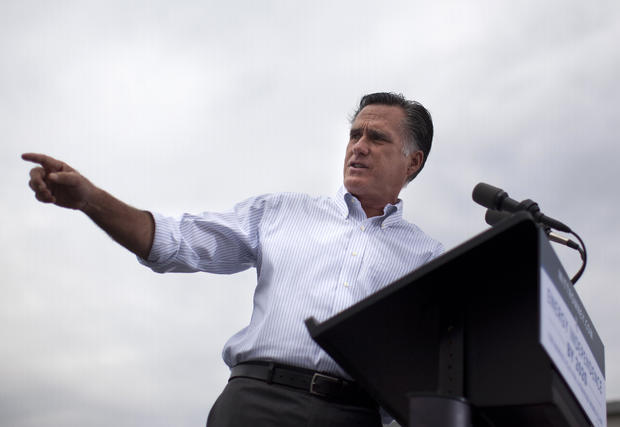Romney outlines his drilling-centric energy plan
(CBS News) HOBBS, N.M. - Mitt Romney laid out his vision for achieving North American energy independence by 2020 today, in part through giving states control over energy development on federal lands within their borders while expanding off-shore drilling in places like Virginia and North Carolina.
"This is not some pie-in-the-sky kind of thing," Romney said of his goal for independence in the next seven years, to a crowd of around 200 people at a trucking and oil-services company in this oil-patch city near the Texas border. "This is a real, achievable objective."
With a bar graph chart next to him titled "North American Oil Production," Romney predicted that his administration would be able to increase the amount of oil barrels produced per day from 15 million to 28 million, by increasing drilling - offshore, in Alaska, and through hydrofracking - as well as boosting the production of natural gas and biofuels and importing more energy from neighboring North American countries.
In addition to Romney's speech focusing on the topic, his campaign released a 21-page white paper outlining his energy strategy, which was broken into six steps. In addition to giving states control over energy development on federal lands within their borders and expanding off-shore drilling on the coasts, a Romney administration will pursue a North American energy partnership that will include the approval of the Keystone XL pipeline. They also plan to overhaul the permitting and regulation process and promote private-sector energy development through investments in research.
(Watch: Romney says energy independence by 2020 is achievable.)
On the stump in New Mexico, Romney promoted his energy plan as a job creator, telling the crowd that it would create three million new jobs. "That's a million in manufacturing. That's a lot of energy-related jobs," he said.
A white paper outlining Romney's energy plan points to several reports and studies that link drilling with job creation, including a March Citigroup report that says drilling could lead to 3.6 million new jobs. But some economists who have looked at the report have questioned whether Romney's plan would make a noticeable dent in the country's unemployment figures.
The Obama campaign dismissed Romney's speech as lacking in policy specifics and steps that would move the country toward energy independence.
"If anything, Romney's policies would take us backward," Obama for America spokesman Lis Smith wrote in an email to reporters. "He wants to keep giving billions of dollars in tax subsidies to the big oil and gas companies and recklessly open new areas for drilling, but turn our back on increasing energy efficiency and developing our clean, homegrown energy sources. That's not a recipe for energy independence- it would only ensure that big oil's profits continue to increase while we cede our clean energy sector, which is supporting jobs in states like Michigan, Ohio, and Iowa, to China."
While Romney's plan is sure to be embraced by the oil and gas industries, it is likely to be far less popular among those working in green and alternative energy fields. Although Romney supports investing in research for new energy technologies, he is not in favor of loan guarantees and subsidies for companies that are developing new technologies, which the Obama administration has pushed with differing levels of success. Romney likes to frequently point to the now-bankrupt solar panel company Solyndra on the campaign trail as an example of government investment run amok.
But Romney's lack of support for some forms of alternative energy - in particular his opposition to the wind tax credit - has ruffled feathers in some of the swing states he's courting, including Iowa and Colorado. In Iowa, several prominent Republicans have voiced there displeasure with Romney's position including Iowa's Governor Terry Branstad and its Senator Charles Grasley who said Romney's position was "like a knife in my back."
Romney adviser Ed Gillespie downplayed the effect that his boss's position on wind energy would have on the results of the election.
"The governor has been clear that we're for all of the above and we're for allowing for alternative means of energy to be produced," Gillespie told reporters in a conference call on Wednesday. "But we also think that energy needs to be on equal footing and that includes wind as well."
As for Iowa, Gillespie said the campaign expects to win in the Hawkeye state.
